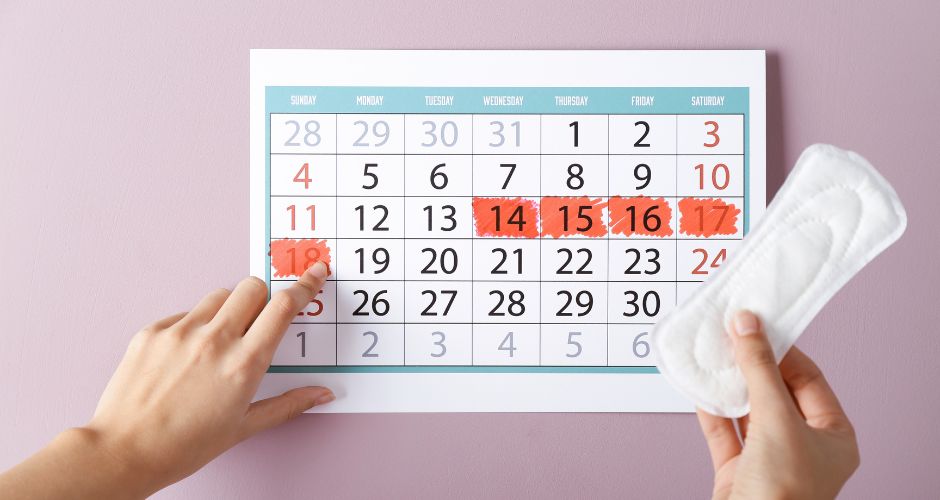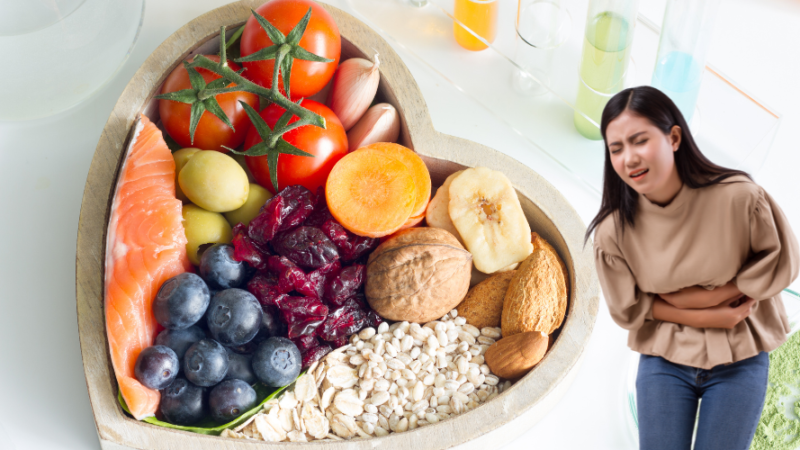Period Mistakes That Every Girl Should Avoid

As a natural part of a woman’s reproductive cycle, menstruation is a topic that deserves careful attention and understanding.
Beginning the journey of womanhood introduces us to the intricate dance of the menstrual cycle, which is a natural and necessary component of reproductive health. However, along the way, every girl may unintentionally make mistakes that affect not only her physical well-being but also her overall menstrual experience.
Menstruation, which is often shrouded in myths and misconceptions, is a subject worthy of open discussion and accurate information. By unraveling the complexities of common period mistakes, we enable girls to approach their menstrual cycles with confidence, self-awareness, and a proactive mindset.
What is Menstrual Cycle
The menstrual cycle is a natural and intricate biological process that occurs in females, typically lasts about 28 days, although it can vary among individuals. This cycle involves a series of hormonal and physiological changes that prepare the female reproductive system for the possibility of pregnancy.

Menstrual Cycle Phases
The menstrual cycle is divided into several phases, each serving a specific purpose:
- Menstrual Phase (Days 1-5): The shedding of the uterine lining results in menstrual bleeding.
- Follicular Phase (Days 6-14): The ovaries prepare an egg (ovum) for potential fertilization.
- Ovulation (Around Day 14): The mature egg is released from the ovary, ready for fertilization.
- Luteal Phase (Days 15-28): The uterus prepares for a potential pregnancy, and if fertilization doesn’t occur, the cycle restarts.
Hormonal Regulation
Hormones play a crucial role in regulating the menstrual cycle:
- Follicle-Stimulating Hormone (FSH): Stimulates the development of ovarian follicles.
- Luteinizing Hormone (LH): Triggers ovulation.
- Estrogen and Progesterone: These hormones, produced by the ovaries, regulate the menstrual cycle’s phases.
Menstrual Blood
Menstrual bleeding is the result of the shedding of the uterine lining, which includes blood, tissue, and mucus. The color and consistency of menstrual blood can vary throughout the cycle.
Cycle Length and Variations
While the average menstrual cycle is 28 days, it’s normal for cycles to range between 21 and 35 days. Factors like stress, diet, and lifestyle can influence cycle length and regularity.
✔️ Top 7 Period Mistakes Every Girl should be aware
While it’s a normal aspect of life, there are common mistakes that many girls inadvertently make during their menstrual cycle. Give a look at top 7 period mistakes every girl should be aware of and, more importantly, how to avoid them.
Ignoring Menstrual Hygiene
One of the most crucial aspects of managing your period is maintaining proper hygiene. Ignoring hygiene practices, such as not changing sanitary pads frequently, can lead to discomfort, infections, and potential health issues.
Avoidance Tips:
- Regular Pad Changes: Always change sanitary products at regular intervals to prevent bacterial growth and odor.
- Hygienic Practices: Practice good personal hygiene, including regular bathing and handwashing.
Skipping Regular Check-ups
Girls and women should schedule regular gynecological check-ups to monitor their reproductive health. Skipping these check-ups can result in the oversight of potential issues, ranging from hormonal imbalances to more serious conditions.
Avoidance Tips:
- Regular Gynecological Check-ups: Schedule annual or biennial gynecological check-ups to ensure early detection of any potential issues.
- Open Communication: Communicate openly with healthcare professionals about any concerns or changes in menstrual patterns.

Ignoring Period Pain
While some degree of discomfort is normal during menstruation, severe or persistent pain should not be ignored. Neglecting period pain can impact overall well-being and may be indicative of underlying issues.
Avoidance Tips:
- Seek Medical Advice: Seek medical advice if you experience severe or debilitating period pain.
- Pain Relief Options: Explore pain relief options, such as over-the-counter medications or natural remedies.
Inconsistent Tracking of Menstrual Cycles
Many girls overlook the importance of tracking their menstrual cycles. Inconsistent tracking can lead to surprises, affecting personal plans and potentially causing stress.
Avoidance Tips:
- Use Menstrual Apps: Use apps or calendars to track menstrual cycles consistently.
- Pay Attention: Pay attention to patterns, symptoms, and irregularities in your menstrual cycle.
Ignoring Dietary Needs
Nutrition plays a crucial role in managing menstrual symptoms. Ignoring dietary needs, especially during menstruation, can contribute to fatigue, mood swings, and other discomforts.
Avoidance Tips:
- Balanced Diet: Consume a balanced diet rich in iron, vitamins, and minerals to support overall health.
- Hydration: Stay hydrated and consider incorporating foods known for their menstrual health benefits.
Overlooking Emotional Well-Being:
Emotional well-being is often overlooked during menstruation. Ignoring emotional needs can impact mental health, exacerbating feelings of stress, anxiety, or mood swings.
Avoidance Tips:
- Self-Care: Prioritize self-care, including activities that promote relaxation and stress relief.
- Seek Support: Seek support from friends, family, or mental health professionals when needed.
Not Educating Others
Lack of education and awareness perpetuates the stigma around menstruation. Girls who avoid educating others contribute to the continuation of misconceptions and taboos.
Avoidance Tips:
- Open Conversations: Engage in open conversations about menstruation to break the stigma.
- Share Information: Share accurate information with peers, family members, and others to foster understanding.
What to Eat and Skip for a Healthier Period
Menstrual Hygiene Tips Every Girl and Woman Should Know
Menstrual hygiene is a critical aspect of women’s health that requires attention and care. Proper menstrual hygiene not only ensures comfort and well-being but also helps prevent infections and complications.
✅Choose the Right Menstrual Products
Selecting the appropriate menstrual products is crucial. Choose from pads, tampons, or menstrual cups based on personal preference, comfort, and lifestyle.
✅Change Products Regularly
Regularly changing sanitary products is essential to maintain cleanliness and prevent bacterial growth. Follow the product’s recommended usage guidelines and change them every 4-6 hours.
✅Dispose of Products Properly
Dispose of used sanitary products in a hygienic manner. Wrap them in toilet paper or use specially designed disposal bags before placing them in the trash. Do not flush sanitary products down the toilet.

✅Choose Cotton Underwear
Cotton underwear allows better air circulation, reducing moisture and preventing the growth of bacteria. Avoid tight-fitting synthetic underwear, as they can trap heat and moisture.
✅Stay Hydrated
Drinking an adequate amount of water helps maintain overall health, including menstrual health. Proper hydration can alleviate bloating and may help reduce cramps.
✅Maintain a Balanced Diet
A nutritious diet rich in vitamins and minerals can contribute to overall well-being during menstruation. Include foods with iron, calcium, and essential nutrients to support your body.
✅Use Mild Soaps
When cleaning the genital area, use mild, unscented soaps to avoid irritation. Harsh soaps and fragrances can disrupt the natural balance of the vagina.
✅Educate Others
Break the stigma around menstruation by educating friends, family, and colleagues. Encourage open conversations to foster a supportive and understanding environment.
FAQ’s
Q: At what age does menstruation typically begin?
A: Menstruation usually begins between the ages of 9 and 16, with the average age being around 12. However, the onset can vary among individuals.
Q: What causes menstrual cramps, and how can they be relieved?
A: Menstrual cramps are caused by uterine contractions during menstruation. To relieve cramps, one can use over-the-counter pain relievers, apply a hot water bag to the lower abdomen, or practice relaxation techniques.
Q: What is ovulation, and why is it important?
A: Ovulation is the release of a mature egg from the ovary, typically occurring around the middle of the menstrual cycle. It is crucial for fertility, as conception is most likely to occur during this phase.
Q: Are there lifestyle factors that can impact the menstrual cycle?
A: Yes, factors like stress, diet, exercise, and overall health can influence the menstrual cycle. Maintaining a healthy lifestyle contributes to regular and balanced menstrual cycles.
Q: Why is menstrual hygiene important, and what are the consequences of neglecting it?
A: Menstrual hygiene is crucial to prevent infections and discomfort. Neglecting it can lead to bacterial growth, unpleasant odors, and potential health issues.
Q: How often should sanitary products be changed during menstruation?
A: Sanitary products should be changed every 4-6 hours, or as recommended by the product’s guidelines, to maintain cleanliness and prevent bacterial buildup.
Q: How can girls avoid the mistake of not educating others about menstruation?
A: Girls can avoid this mistake by engaging in open conversations, breaking the stigma around menstruation, and sharing accurate information with peers, family, and friends.






